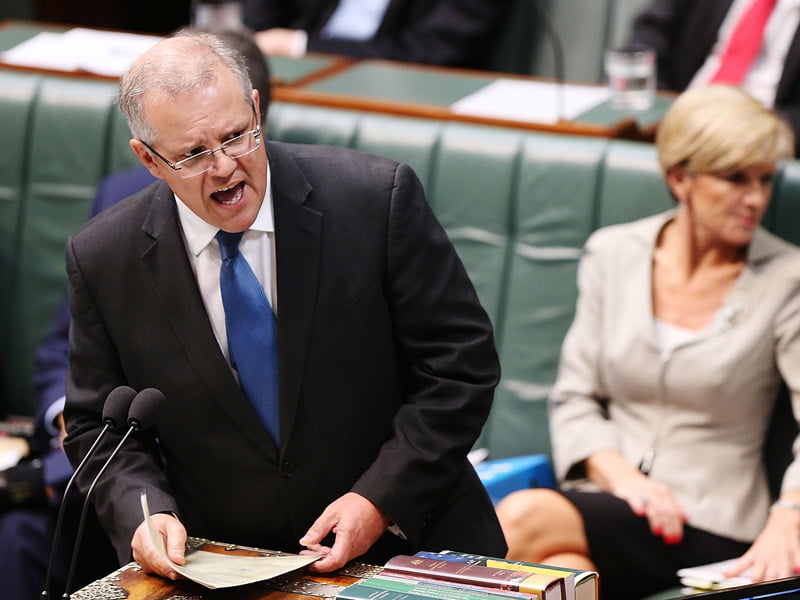The federal government has banned Chinese tech companies Huawei and ZTE from participating in the Australian 5G network.
Acting Home Affairs Minister Scott Morrison issued a statement early on Wednesday morning, amidst increasing leadership speculation and turmoil in Canberra, outlining new security precautions that will be taken with the rollout of the 5G network.

While the statement did not specifically name Huawei or ZTE, it all but confirmed the Shenzhen-based telecommunications giant would be banned from the network, with the key paragraph towards the end:
“The government considers that the involvement of vendors who are likely to be subject to extrajudicial directions from a foreign government that conflict with Australian law, may risk failure by the carrier to adequately protect a 5G network from unauthorised access or interference,” Mr Morrison’s statement said.
“This applies equally to all carriers, consistent with government’s long-standing commitment to a level playing field in the sector,” it said.
“Carriers may still need to apply controls regardless of the vendor they choose. These controls would not displace existing cybersecurity practices or business risk mitigations.”
In a statement posted to Twitter, Huawei Australia confirmed the ban.
“We have been informed by the government that Huawei and ZTE have been banned from providing 5G technology to Australia. This is an extremely disappointing result for consumers. Huawei is a world leader in 5G, has safely and securely delivered wireless technology in Australia for close to 15 years,” the company said.
Huawei was also banned from any involvement with the National Broadband Network.
The concern with Huawei centres around new laws recently passed in China which compel “all organisations and citizens” to help the country’s intelligence work and alert the government of any vulnerabilities identified, along with its perceived link to the government.
There have been long-standing fears that this law would force the company to pass on data and potential vulnerabilities in the 5G network to the Chinese government.
Huawei has repeatedly refuted these claims, and has heavily lobbied Australian lawmakers and the public in recent months.
But after an “extensive review of the national security risks to 5G networks” the federal government has rejected Huawei’s involvement.
The statement explained how it would be split into ‘core’ network and ‘edge’ network, with Huawei looking to provide the latter, with antennas, base stations and phones.
Although the company is not looking to supply ‘core’ network elements, there are still major security risks with the ‘edge’ components, the government said.
“Where previous mobile networks featured clear functional divisions between the core and the edge, 5G is designed so that sensitive functions currently performed in the physically and logically separated core will gradually move closer to the edge of the network. In that way, the distinction between the core and the edge will disappear over time,” it said.
The government has been unable to find a “combination of technical security controls that sufficiently mitigate the risks”.
“This new architecture provides a way to circumvent traditional security controls by exploiting equipment in the edge of the network – exploitation which may affect overall network integrity and availability, as well as the confidentiality of customer data. A long history of cyber incidents show cyber actors target Australia and Australians,” the government said.
“While we are protected as far as possible by current security controls, the new network, with its increased complexity, would render these current protections ineffective in 5G.”
All third party vendors in the 5G network will be subject to new Telecommunications Sector Security Reforms laws, which include the power for the government to request more detail information on a network’s operations and the ability to intervene and issue directions to a company when there’s “significant national security concerns”.
The government is looking to address these security concerns in partnership with the private industry, Mr Morrison said.
“The government has now provided carriers with clear guidance about how their new legal obligations apply to 5G networks. The government will continue to engage and support Australians, including the telecommunications industry, to manage national security risks. The government’s first priority will always be the safety and security of Australians,” he said.
Huawei Australia has rallied in recent months against attempts to have the company blocked from the 5G network, with Cyber Security Officer Malcolm Shore saying the arguments were based on “unsubstantial speculation”.
“We’ve seen over the last few months the defence sector seeking to have Huawei banned from selling 5G equipment and there have been suggestions that Huawei would plant backdoors in their system and would be willing to do the PLA’s bidding,” he said.
“But there’s been no specific allegations and much less any proof. Any rational assessment would conclude that a $100 billion private company would not want to be found compromising itself.”
And a ban would make Australia’s 5G network more vulnerable to attack, he said.
“The risk associated with 5G are for the next three to five years less than that for 4G. The biggest risk for 5G are the new core components, and they’ll be available around 2020,” Mr Shore said.
“But Huawei doesn’t sell any core components in Australia, and the components Huawei does sell are more secure than their 4G counterparts. Why ban Huawei when it’s actually going to reduce the risks to our networks, not increase it,” he said.
Do you know more? Contact James Riley via Email.

